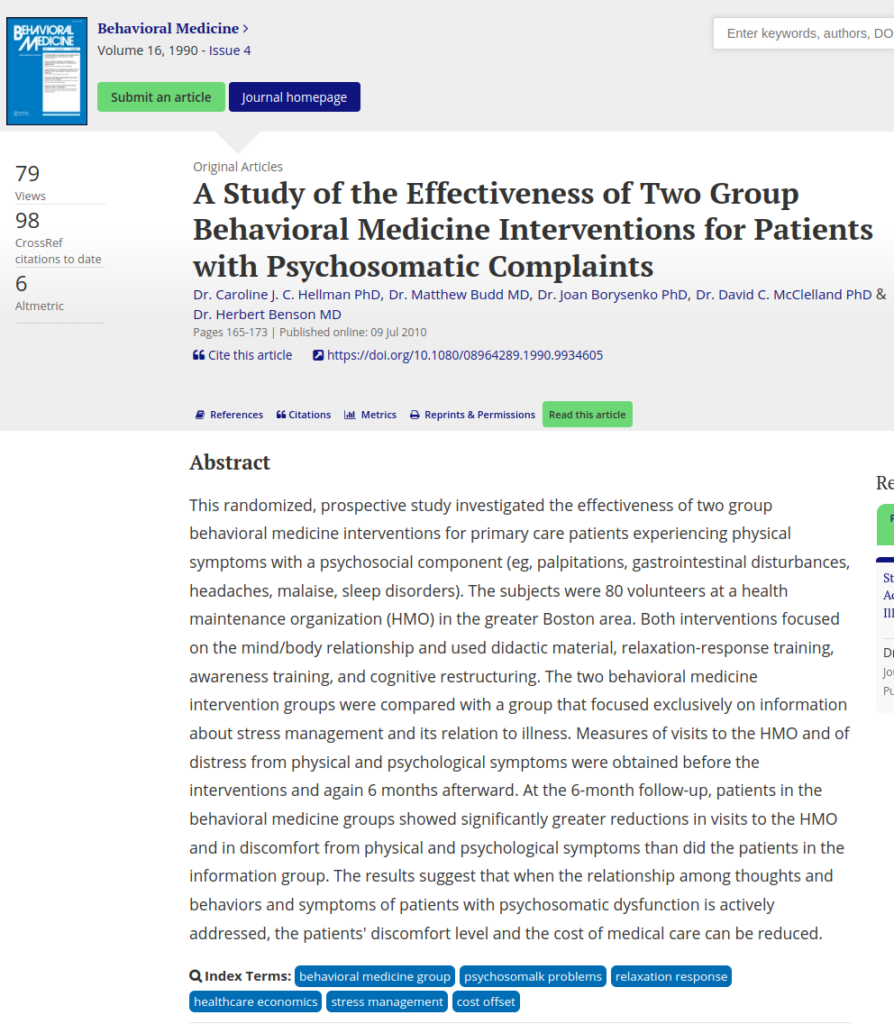This randomized, prospective study investigated the effectiveness of two group behavioral medicine interventions for primary care patients experiencing physical symptoms with a psychosocial component (eg, palpitations, gastrointestinal disturbances, headaches, malaise, sleep disorders). The subjects were 80 volunteers at a health maintenance organization (HMO) in the greater Boston area. Both interventions focused on the mind/body relationship and used didactic material, relaxation-response training, awareness training, and cognitive restructuring. The two behavioral medicine intervention groups were compared with a group that focused exclusively on information about stress management and its relation to illness. Measures of visits to the HMO and of distress from physical and psychological symptoms were obtained before the interventions and again 6 months afterward. At the 6-month follow-up, patients in the behavioral medicine groups showed significantly greater reductions in visits to the HMO and in discomfort from physical and psychological symptoms than did the patients in the information group. The results suggest that when the relationship among thoughts and behaviors and symptoms of patients with psychosomatic dysfunction is actively addressed, the patients’ discomfort level and the cost of medical care can be reduced.
A Study of the Effectiveness of Two Group Behavioral Medicine Interventions for Patients with Psychosomatic Complaints
Publication
Behavioral Medicine
Volume 16, 1990 - Issue 4
Abstract
Web and Email Links
Related Listings
Journal
Obstet Gynecol
During a 5-month study, we examined the effects of the relaxation response on premenstrual syndrome in 46 women who were randomly assigned to one of three groups: a charting group, a reading group, and a relaxation response group. The relaxation response group showed significantly greater improvement than the charting and the reading groups on physical symptoms (P less than .025 for both comparisons). There was a significant group-by-severity effect for charting versus relaxation resp […]
Journal
Behavior Research and Therapy
The theoretical basis of systematic desensitization is reciprocal inhibition in which an alternative, competitive response to anxiety is conditioned to arousal-producing, phobic stimuli. Abbreviated training in progressive relaxation is believed to serve as a competitive response to anxiety by decreasing autonomic nervous system activity. However, physiologic studies of progressive relaxation have not substantiated that its practice is associated with such decreased autonomic activity […]
Journal
Journal of Cardiovascular Nursing
Hypertension is one of the leading health problems in the United States. It is commonly accepted that as many as 60 million Americans have hypertension, with the majority (>70%) having mild elevations (diastolic pressure range, 90-104 mm Hg). The treatment of hypertension accounts for more office visits to health care providers and more treatment than any other medical diagnosis. A 1980 National Institutes of Health survey showed that about 2% of visits to health care providers wer […]

